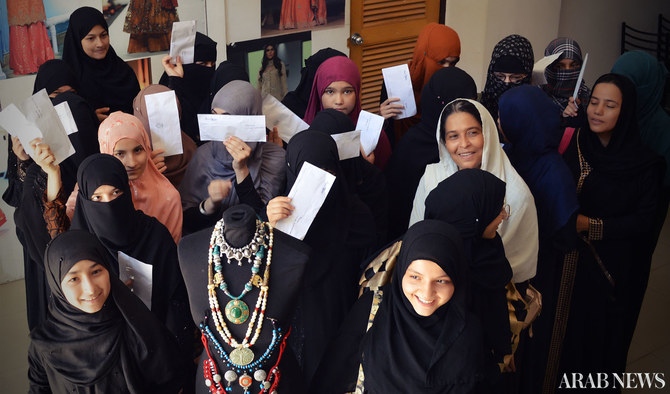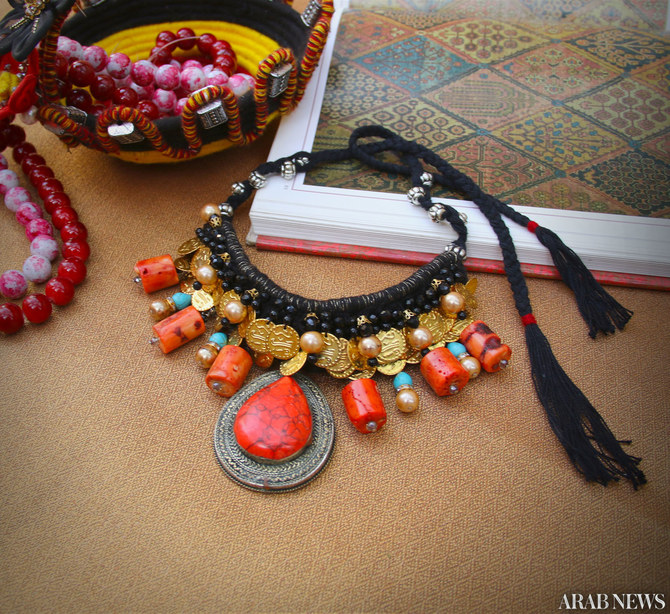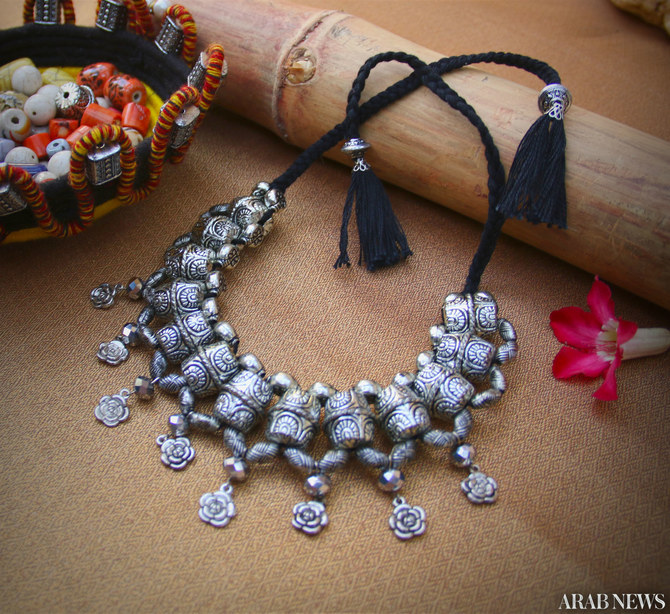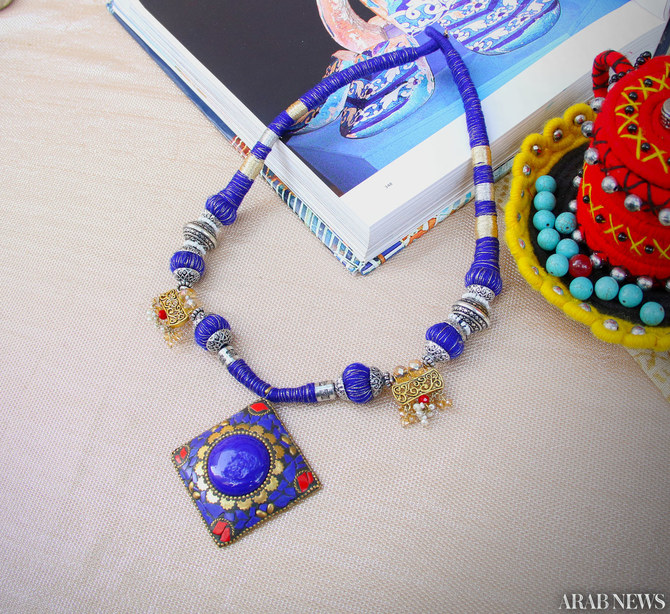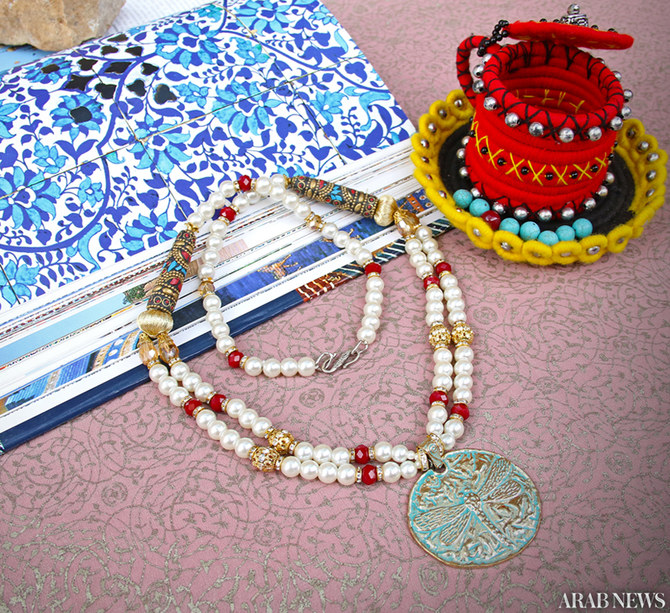Do you remember what you did with your first paycheck?
For 22-year-old Afghan refugee Malika Qahar, it means that she will finally be able to buy new clothes for her parents on Eid.
From her tiny apartment located at the outskirts of Sohrab Goth – a neighborhood in Karachi mostly inhabited by Afghan refugees – Qahar said she’s waited for this day for months, ever since she began working as a jewelry maker for a local Pakistani brand.
On Monday, FnKAsia helped her and 24 other refugee women inch closer to realizing their dream of becoming financially independent by giving them their first paychecks.
“Today, I got my first earning. I am going to purchase clothes for my mom and father. I will also purchase gifts for my brothers and sisters,” Qahar said.
It’s a big deal for Qahar who had to drop out of college when the family fell on hard times. Things took a turn for the worse when they were displaced by the Afghan war and eventually ended up as refugees in a camp in Sindh.
According to the United Nations High Commissioner for Refugees, Pakistan continues to host 1.39 million refugees from Afghanistan, with nearly 63,000 residing in the Sindh province alone, mostly in Karachi.
With employment opportunities few and far between, several struggles to make ends meet, with most resorting to menial jobs, such as picking thrash, to take a dollar or two home.
So, when FnkAsia decided to take the 25 refugees under its wings in November last year – to train them in tasks which would make them self-reliant and economically independent – Qahar says she jumped at the opportunity.
Besides financial independence, she said the job has also helped her forge a stronger bond with her family members.
“Now, I just inform my mom if I have to leave home. For my father, other family members it will be a surprise,” Qahar said, adding that her father who washes dishes at a local hotel in Al-Asif square, has encouraged her from day one to find her own niche.
The program, which was for a duration of three months, saw Huma Adnan, Founder of Craft Stories and FnkAsia, designate three women – namely Shareefa, Sakina and Sitara Syed – as trainers for the purpose.
Eventually, the three would go on to teach six women each at a center located in the Afghan refugee camp in Karachi.
Made with expensive material, which includes metallic silk threads, gold wires, glass micro cut beads, pearls, metal accessories, stones, and lamb suede backing, the earnings from each set of jewelry is more than 40 percent, with the rest being paid toward the cost of material and marketing.
Together, the women create three pieces of jewelry a day, which FnkAsia sells at a retail price of Rs 2,500 per piece. The initiative gained traction when Pakistan’s top models and TV actresses displayed the stunning jewelry during a fashion show in Karachi, in March this year.
“This is a huge success story. We not only teach [them how to make] handicrafts but train them to be leaders and entrepreneurs. They are quick learners, meet deadlines and have precision,” Adnan said, adding that plans are in place to hire more teachers to train 50 more women in the craft.
While locally the demand for the products is low, Adnan says the “international market can get a better price and better share for the products.”
The refugee women, for their part, are not complaining.
Sitara Syed, who is raising her four children as a single mother – after her husband went missing in Kandahar over a decade ago – says that her only regret is that her children couldn’t pursue their education.
“I have been washing dishes at people’s homes for the last five to six years after I came to Pakistan. Now when I have started earning, I want my children, at least the two daughters, to re-join school which they had left in seventh and three classes,” she said.
Qahar says while the earnings may be meager at the moment, it’s not her definitive goal right anymore. “I want to start my own business, train women of my family and sell their work with help of FnkAsia,” she said.
“I’d never dreamt of being where I am today, but now I have started dreaming more. I am sure my dream of setting up my own business will materialize soon,” Qahar said.
Top fashion brand pays it forward by rewarding 25 Afghan women
Top fashion brand pays it forward by rewarding 25 Afghan women

- Refugees receive first salaries for making jewelry as part of Pakistan project
- FnkAsia to train 50 more individuals in the program aimed at self-reliance
On World Press Freedom Day, Pakistan honors journalists killed in Gaza

- Israel’s war on Gaza has killed 232 journalists, an average of 13 per month, making it the deadliest conflict for media workers
- President Asif Ali Zardari says media is indispensable in promoting dialogue, highlighting social, economic and environmental issues
ISLAMABAD: Pakistan’s President Asif Ali Zardari on Saturday hailed journalists who lost their lives while reporting in conflict zones like Gaza, saying their dedication continues to inspire others.
The statement came on the World Press Freedom Day on May 3 that aims to raise awareness about the importance of press freedom and remind governments of their duty to respect and uphold the right to freedom of expression enshrined under Article 19 of the 1948 Universal Declaration of Human Rights.
Israel’s war on Gaza has killed 232 journalists – an average of 13 per month – making it the deadliest conflict for media workers ever recorded, according to a report by the Watson Institute for International and Public Affairs’ Costs of War project issued on April 1.
More journalists have been killed in Gaza than in both world wars, the Vietnam War, the wars in Yugoslavia and the United States war in Afghanistan combined. The 18-month Israeli war, which began after the Oct. 2023 attacks on Israel by Hamas, has also killed more than 52,000 Palestinians, laying waste to almost all of Gaza.
“[We] honor the sacrifices made by those who have lost their lives in pursuit of truth, especially reporting in conflict zones like Gaza and Palestine,” President Zardari said in his statement on the day.
“Their courage and dedication continue to inspire us.”
The media is indispensable in promoting dialogue, highlighting issues of social, economic and environmental significance, uncovering corruption and advocating for the marginalized communities, according to the Pakistan president.
Article 19 of the Constitution of Pakistan guarantees the right to freedom of speech and a free press, subject to “certain restrictions.”
Pakistan ranks 152nd out of 180 countries on Reporters Without Borders (RSF) press freedom index, and journalists in the country have long complained of increasing state pressure on traditional media. Social media platform X is officially banned, but accessible using VPNs, while YouTube and TikTok have faced bans in the past.
“We have taken a number of steps for the protection and welfare of journalists, but more needs to be done by providing them a safe, secure, and enabling environment,” Zardari said.
“A culture where journalists feel secure to perform their duties without fear and harassment is the need of the time. I urge the media to uphold the highest standards of journalism, accuracy, and professionalism.”
Pakistan will strike any Indian structure built to divert its water, minister says

- India suspended a key water-sharing treaty with Pakistan after an attack in Indian-administered Kashmir that New Delhi has blamed on Pakistan
- Pakistan has denied involvement in the attack that killed 26 tourists and described India’s suspension of the treaty as an ‘act of war’
ISLAMABAD: Pakistan will destroy any structure built by India to divert its share of water under the Indus Waters Treaty, Defense Minister Khawaja Asif said on Friday, amid heightened tensions between the two countries over an attack in the Kashmir region.
India suspended on April 23 the World Bank-mediated Indus Waters Treaty of 1960 that ensures water for 80 percent of Pakistani farms, saying it would last until “Pakistan credibly and irrevocably abjures its support for cross-border terrorism.”
The development came a day after an attack killed 26 tourists in Indian-administered Kashmir’s Pahalgam tourist town. India said two of the three militants who attacked tourists were from Pakistan. Islamabad denied the allegation and said any attempt to stop or divert the flow of Pakistan’s water will be considered an “act of war.”
Speaking to a private news channel on Friday night, Asif said diverting Pakistan’s water was also a “face of aggression” against the country and entire nations could die of thirst and hunger because of it.
“That will be aggression against Pakistan,” he said. “So, even if they made an architectural attempt of this kind, then Pakistan will destroy that structure.”
Pakistan has rights to the western rivers — Indus, Jhelum, and Chenab — for irrigation, drinking, and non-consumptive uses like hydropower, according to the Indus Waters Treaty. India controls the eastern rivers — Ravi, Beas, and Sutlej — for unrestricted use but must not significantly alter their flow. India can use the western rivers for limited purposes such as power generation and irrigation, without storing or diverting large volumes.
Asif’s comments came hours after Pakistan’s top generals blamed the April 22 attack on New Delhi’s “governance failures” and its strategy of using such incidents for political gains, warning Pakistani security forces were ready to respond to any attack on the country’s sovereignty.
Pakistan Army’s top brass gathered at the General Headquarters (GHQ) in Rawalpindi on Friday to review the geo-strategic environment, with a particular focus on the Pakistan-India standoff and the broader regional security situation, the military’s media wing, Inter-Services Public Relations (ISPR), said.
“The Forum noted, with serious concern, India’s consistent pattern of exploitation of crises to achieve political and military objectives. They have been following a predictable template — whereby internal governance failures are externalized,” the ISPR said.
“These incidents have often coincided with unilateral moves by India to alter the status quo, as seen in 2019 when India similarly exploited the Pulwama incident to unilaterally alter the status quo of Indian Illegally Occupied Jammu & Kashmir, through revocation of Article 370,” it added.
The 2019 Pulwama attack killed 40 Indian paramilitary personnel and was also blamed on Pakistan before New Delhi revoked the region’s special constitutional status to integrate it in the Indian union, a move repeatedly condemned by Islamabad.
Tensions have been high in the South Asian region since last week’s attack in Kashmir, a situation exacerbated by retaliatory actions between the two nuclear-armed rivals, including the expulsion of diplomats and citizens, border closures and airspace shutdowns.
Pakistan and India have a history of bitter relations. They have fought two of their three wars over Kashmir, a region split between them, since gaining independence from the former British colonial rule in 1947.
On Friday, Pakistan Prime Minister Shehbaz Sharif with envoys from Gulf allies and briefed them on Islamabad’s stance regarding the April 22 attack in Indian-administered Kashmir, seeking to defuse tensions.
The international community has encouraged both sides to exercise restraint and resolve the crisis through dialogue.
Pakistan’s factory PMI dips in early sign of global tariff headwinds

- New orders slumped while export orders in particular plummeted
- Employment fell for a second month as manufacturers cut costs
KARACHI: Pakistan’s manufacturing sector growth slowed to a seven-month low in April, with the HBL Pakistan Manufacturing Purchasing Managers’ Index (PMI)easing to 51.9 from 52.7 in March, as concerns over global trade weighed, HBL said in a press release.
The latest dip in the index hints at the impact of US President Donald Trump’s trade tariffs, said Humaira Qamar, Head of Equities & Research at HBL.
“We believe that the latest PMI dips are early signs of the headwinds to the global economy from the introduction of US tariffs,” said Humaira Qamar — Head Equities & Research at HBL.
New orders slumped while export orders in particular plummeted. Employment fell for a second month as firms cut costs, said Qamar.
Qamar warned that any US stagflation would hurt Pakistan’s exports, particularly to the US which accounts for 18 percent of its total, potentially prolonging the manufacturing downturn, though lower commodity prices could provide some relief, she added.
Despite the slowdown, the PMI remains above 50, indicating expansion amid a favorable inflation outlook.
Qamar said she expects an interest rate cut on Monday due to strong deflationary pressures. But a Reuters poll suggests Pakistan’s State Bank will hold rates steady at 12 percent, following a surprise pause in its last meeting due to geopolitical tensions and inflation concerns.
Pakistan’s annual inflation rate fell to 0.3 percent in April, well below the Ministry of Finance estimate of 1.5 percent to 2 percent. The central bank forecasts average inflation to be in the range of 5.5 percent to 7.5 percent for the fiscal year ending June.
Pakistan’s largest bank, HBL, and global financial information and analytics firm S&P Global launched the index In February to track the country’s manufacturing sector.
China’s BYD partners with local firms to launch largest EV charging network in Pakistan

- 128 DC fast chargers will be installed across Pakistan over the next three years
- Pakistan approved EV policy in 2019 with a target of 30 percent electric vehicles by 2030
KARACHI: China’s BYD, the world’s largest New Energy Vehicle (NEV) manufacturer and Pakistan’s Mega Motor Company (MMC) have partnered with Hub Power Company (HUBCO) to launch the country’s largest NEV charging network, the company said on Friday.
NEVs refer to alternative-fuel vehicles that rely on electric, hybrid, hydrogen or other non-traditional power sources instead of conventional gasoline or diesel engines
BYD, a global leader in battery-electric and plug-in hybrid vehicles, has expanded aggressively in Asia, Europe and Latin America. Mega Motor, a subsidiary of Pakistan’s HUBCO, is spearheading the local manufacturing, distribution and sales of BYD-branded vehicles.
“This nation-wide rollout of infrastructure marks one of the most significant developments in the country’s shift toward electric mobility by addressing a critical gap in Pakistan’s EV ecosystem and establishing the most extensive NEV charging network,” BYD said in a statement.
“As part of this strategic and groundbreaking roadmap, HGL will install approximately 128 DC fast chargers across the country over the next three years, with 50 installations planned by December 2025.”
It added that the charging points would be placed every 150-200 kilometers of highways and motorways along with malls, hotels and hospitals.
“Range anxiety remains one of the most significant barriers to NEV adoption across Pakistan,” BYD Pakistan Vice President Sales and Strategy Danish Khaliq said.
“Through this groundbreaking partnership with HUBCO Green, we are not just addressing a logistical issue but shaping the entire mobility landscape of the country.”
BYD and MMC partnered last year to introduce electric vehicles (EVs) in Pakistan, aiming to accelerate the country’s transition toward sustainable mobility.
The government approved the National Electric Vehicles Policy in 2019, setting a target of 30 percent EVs by 2030. In March, Pakistan inaugurated the country’s fastest EV charging station in Islamabad.
Earlier this year, Pakistan announced a 45 percent reduction in power tariffs for electric vehicle charging stations. The government is also planning financing schemes for e-bikes and the conversion of two and three-wheeled petrol vehicles.
According to a report submitted by the power ministry, there are currently more than 30 million two- and three-wheeled vehicles in Pakistan, which consume more than $5 billion worth of petroleum annually.
In January, China’s ADM Group revealed plans to invest $250 million in setting up an electric vehicle manufacturing plant in Pakistan.
Pakistan stocks slide on India tensions, key sectors lose up to 15% after Kashmir attack

- Foreign investors remained net sellers in April, taking their outflows since July to $252 million
- The market recovered some of its losses on Friday but remains volatile heading into next week
KARACHI: Pakistan’s renewed tensions with archrival India have weighed heavily on the country’s stock market, with key sectors like refineries posting losses of up to 15 percent since a gun attack killed 26 tourists in the disputed Kashmir region on April 22, according to analysts and market data on Friday.
India blamed Pakistan for the attack despite Islamabad’s denial and call for a neutral probe. The escalation, which has seen border closures, tit-for-tat diplomatic expulsions and fears of military confrontation between the nuclear-armed neighbors, has drawn international concern.
The KSE-100 Index, Pakistan’s benchmark stock gauge, fell 6 percent over six trading sessions following the attack, according to Pakistan Stock Exchange (PSX) data.
The market recovered some losses on Friday but remained volatile heading into next week.
“Pakistan’s stock market experienced heightened volatility after the Pahalgam attack,” Sana Tawfik, an economist and head of research at Arif Habib Ltd., told Arab News while referring to the attack in Indian-administered Kashmir.
Between April 22 and April 30, the index dropped 7,104 points or 6 percent, she said.
Key sectors bore the brunt of the sell-off, including refineries (-15.4 percent), transport (-15 percent), pharmaceuticals (-12.9 percent), jute (-11.6 percent) and engineering (-9.2 percent).
“This decline reflects broad investor risk aversion amid geopolitical uncertainty,” she added.
The latest flare-up with India added to pressure on Pakistani equities, which had already been hit by US President Donald Trump’s tariff increases last month. That triggered panic selling and a one-hour trading halt at the PSX.
“Foreigners remained net sellers [in April] as well, taking 10MFY25 net outflow to around $252 million,” JS Global Capital Ltd., the largest broking and investment banking firm in Pakistan, said in a note to clients.
Muhammad Waqas Ghani, its head of research, said investor caution over Pakistan’s escalating tensions with India had driven the recent market volatility.
“The impact of geopolitical concerns is beginning to wear off,” he said.
On Friday, the KSE-100 rebounded 2.5 percent to 114,113 points, trimming overall losses to 3.6 percent. Ghani attributed the recovery to US diplomatic efforts to defuse tensions between the two neighbors.
“The market opened positive today [Friday], gaining 2,900 points or 2.6 percent in the first half,” he said.
Analysts said calls for restraint from the US, United Nations and other members of the International community contributed to Friday’s rally.
US Vice President JD Vance told Fox News in a podcast interview that Washington was working to prevent further escalation and preserve regional peace.
Mohammed Sohail, CEO at Topline Securities Ltd., said stocks bounced back as investors regained confidence amid “signals of easing tensions.”
JS Global said market sentiment could improve further after the International Monetary Fund’s (IMF) expected release of funds for Pakistan following its upcoming executive board meeting this month.
“Materialization of planned foreign inflows, likely after IMF disbursement, along with geopolitical stability, remains crucial for the country and equity markets,” it added.


